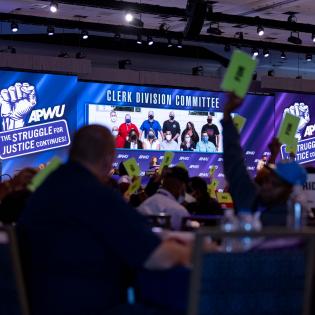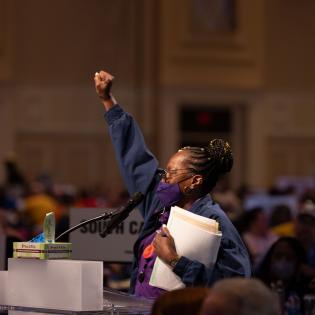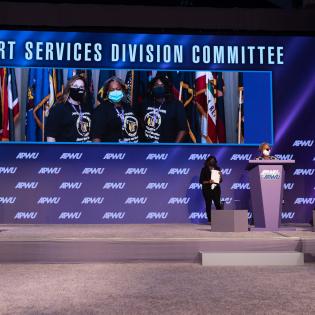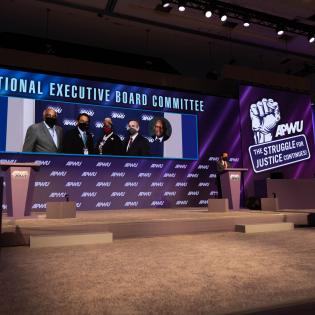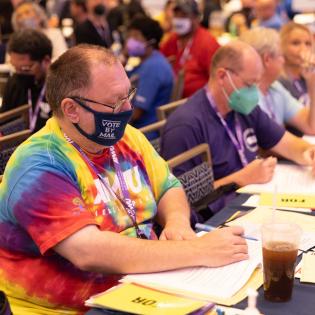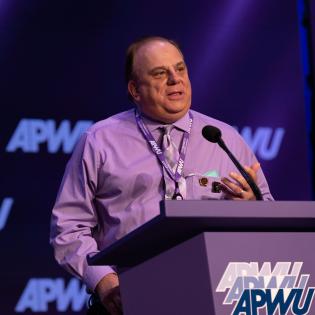August 18, 2022
APWU Convention, Day 4: Completing Resolutions, Union History and International Solidarity
Delegates complete their work on resolutions
On the fourth and final day of convention delegates resumed voting on the remaining committees’ resolutions beginning with the Formal Resolutions Committee. Issues such as supporting the Green New Deal calling for the resignation or firing of Postmaster General Louis DeJoy and backing postal banking statehood for Washington DC and the APWU’s recognition of November 27 as “Public Post Office Day” were brought forth and supported by the body.
The National Executive Board (NEB) Committee continued the day where delegates voted on matters relating to negotiated service contracts addressing sexual harassment in the USPS membership rights for full dues paying members and re-establishing a full-time trained Safety and Health position at APWU Headquarters.
Several additional resolutions were introduced throughout the day. The Labor Management Committee recommended improvements to the holiday pecking order while the Legislative Committee sought to make election day a paid holiday. Both resolutions were supported and passed by the convention body.
Resolutions were finalized with reports from the Clerk Maintenance Motor Vehicle Services and Support Services Division’s committees reporting to the body. Motions were made in each instance to pass the resolutions “in toto” according to the will of the respective craft and division conference bodies and as reflected in the respective committee recommendations. The motion to accept “in toto” passed for each of the committees.
International Solidarity Unites the Continents
International solidarity was the order of the day as the Convention received fraternal greetings from British and Spanish trade union leaders Pepe Sayagués (Unión General del Trabajadores – UGT) and Dave Ward (Communication Workers Union – CWU).
General Secretary Ward offered delegates his “solidarity and fraternal greetings” in a video address. Ward was unable to attend in person due to his ongoing involvement in a wave of industrial strikes and disputes involving postal workers telecommunications workers railway workers and bus workers who are all at the center of what the overseas media is calling the “summer of discontent.”
However Ward said that “I think people have finally realized from across the whole of the world… that if trade unions don’t come together then it’s always going to be working people that pay the price…people are actually saying ‘enough is enough.’”
Ward then referenced a new “Enough is Enough” organizing campaign which in just two days had more than 250,000 people signed up in support of trade unions building collectivism fighting for members inside and outside the workplace to “deliver a new deal for working people.”
“We shape the change,” Ward continued. “There is a future for our postal services. We and our members make a great contribution to local and national economies and we also add tremendous social value.” He finished by telling delegates “Keep on rocking in the free world!”
Delegates Celebrate the Great Postal Strike
The last day of convention also included a video tribute to the 50th anniversary of Great Postal Strike of 1970.
The video was originally slated to be shown at the 25th biennial convention which was cancelled due to the COVID pandemic. It honored the workers and legacy of the historic wildcat strike and the formation of the American Postal Workers Union.
It described the events that led up to the strike which within days of the first walk-outs in New York City had spread to 200,000 postal workers in over 30 states.
When an anchor for CBS News challenged Chicago postal worker Greg Boyles for breaking the law he said “I don’t care. I know it is against the law…if they want to put me in jail put me in jail but they haven’t got a big enough jail to put all of us in.”
President Nixon activated the National Guard which proved inept at delivering for the people. TIME magazine reported that “after just a few days of stoppage the effects of the shutdown appeared to be little short of devastating,” as the movement of letters business mail financial transactions and government documents ground to a halt.
When the Postmaster finally agreed to return to the bargaining table postal workers won a retroactive 6 percent wage increase and combined with Congressional action on August 12 1970 the Postal Reorganization Act was signed into law giving workers an additional 8 percent wage increase and the right to bargain collectively over wages benefits working conditions and instituted a binding arbitration process.
Millions of workers have since reaped the benefits from the historic actions of the postal workers who joined in solidarity to fight for their collective rights.
